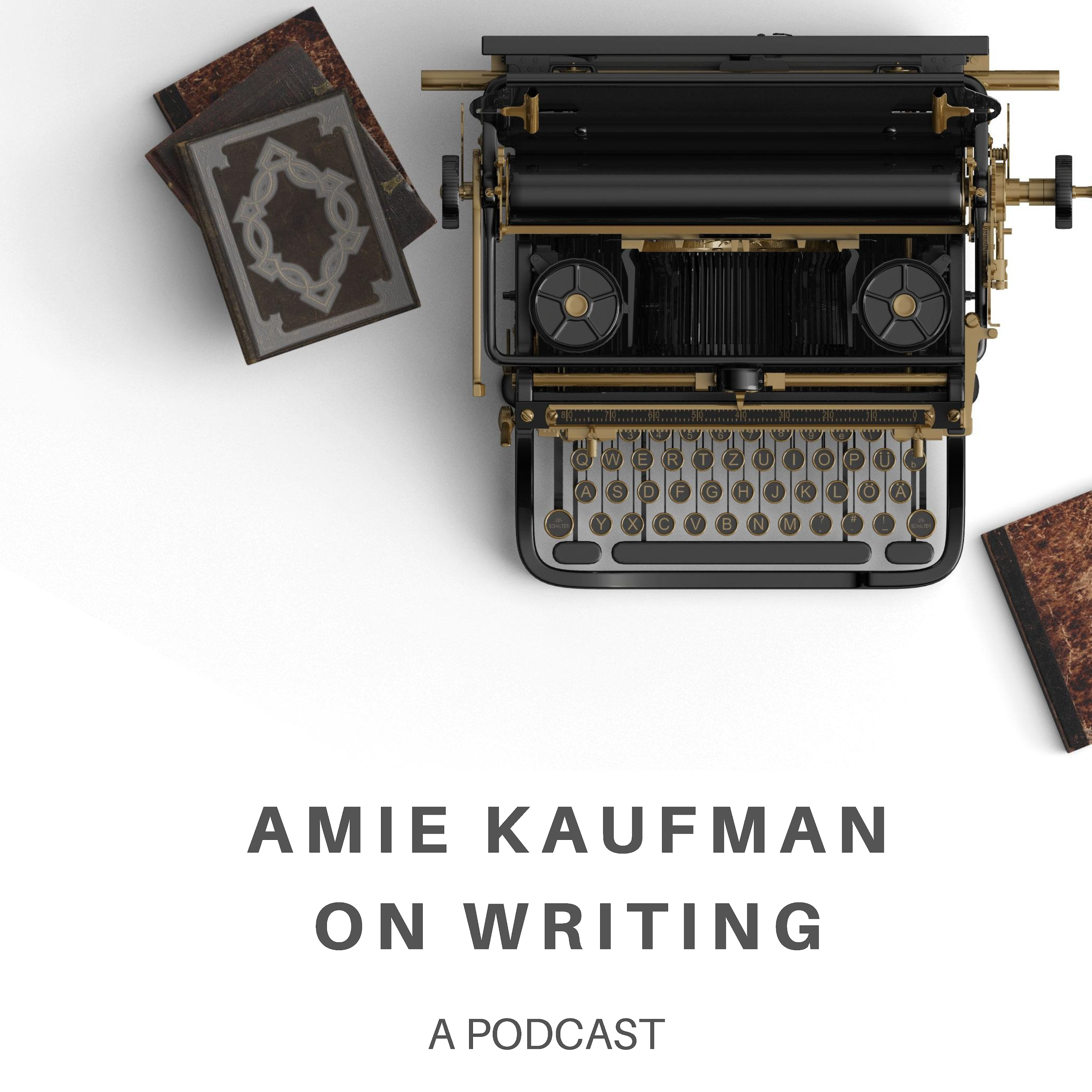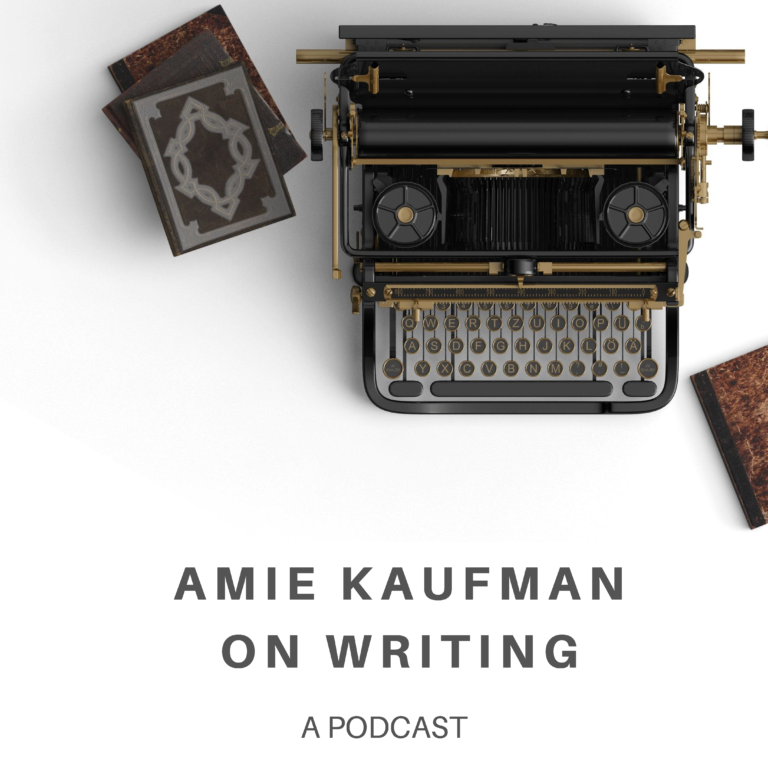Episode 8: Falling Out of Love With Your Story

New York Times and internationally bestselling author Amie Kaufman answers one question each week about writing craft. Full of practical tips and an exercise each week, this is a show for writers, for readers who want a backstage look at how their favourite authors craft their stories, or for creative writing classrooms.
You can find a transcript of this episode at my website, where you can also subscribe to my newsletter, get behind-the-scenes peeks at how I write, and any other news about new books, events or the podcast. You can also submit a question for the podcast on my website. You can find me on Twitter or Instagram.

FOLLOW ON APPLE PODCASTS . FOLLOW ON SPOTIFY . FOLLOW ON OVERCAST . FOLLOW ON PODCAST ADDICT
Season 2, Episode 8: Falling Out of Love With Your Story
Hi, my friends.
Welcome to Amie Kaufman on Writing, a short podcast that answers one question each week about how writers do what they do.
If you’re a writer, or you’re a reader interested in how your favourite authors craft their stories, then you’re in the right place.
This is Season 2, Episode 8: Falling Out of Love With Your Story
Here’s my friend and producer Kate with this week’s question. Hi Kate, how are you?
Hi Amie, I’m good!
This week’s question is from Nylah, who says: I always love my stories when I begin them, but somewhere along the way I start to lose interest. Do you have any advice on how to keep going?
It’s also from Stephanie, who asked: How do I keep myself motivated when I’m writing a first draft?
Aaaaand it’s from Vanessa, who asked: How do you deal with it when you start to feel, about thirty pages in, that your story is rubbish?
This question was a very, very popular one—those aren’t even all the versions of it we received. And I know exactlywhy listeners are asking. I know this feeling too!
You know that moment when you get a brand new notebook? The pages are crisp and clean, the cover is unscuffed. Looking at it, you know that this time, your handwriting will be perfect. Your notes will be clear. You won’t have to cross anything out, your pen won’t run out halfway through a sentence. It won’t end up all dog-eared.
This notebook is not yet anything, and therefore it can be anything.
Then, of course, you start writing. And your handwriting is the same as always, and you do have to cross things out, and draw little arrows where you forgot to include a point, and then you rip a page out for your shopping list, and very soon that dream of perfection is gone.
It’s just the same with stories. They’re masterpieces in our minds, but as soon as we see the reality, we begin to understand all the ways in which they’re flawed. And it’s very easy indeed to start to fall out of love with them.
It happens to everyone, and if you’re like the rest of us, pretty soon you’ve lost perspective, and you’re wondering if you should scrap the whole thing, or wander off to that other idea that seems perfect, all shiny and full of potential.
Now, sometimes you’re right, and the story really isn’t working. Perhaps you’ve realized it’s not your story to tell, or you were trying to follow a trend, or your heart isn’t in it. But most of the time, this urge to elope with a different story idea is a perfectly normal part of the process.
In season one, you’ll find an episode about writer’s block, in case what you’re feeling is the urge to avoid writing altogether. But if you’re perfectly happy to write, just not the story you started, then here are four quick tips for falling back in love. Then next week, I’ll be following up with an episode on how to become a finisher, pushing on to the very end of your draft.
So, four tips to help you fall in love with your story again.
One: Go searching for the spark. There are lots of ways to do this, but the goal is the same—you’re looking for that falling-in-love tingling feeling that hit you when you first came up with this story. You could make yourself a playlist, or pull together a Pinterest board of images that evoke the look, the feel, the mood or the world of your story.
A technique my writing partner Meagan Spooner taught me that I also use to help me find the spark in a story is deliberate daydreaming. You create an atmosphere conducive to daydreaming—my go-to is a really nice bath, but yours might be a walk, or a shower, or a cozy couch with some cushions. Then you just let the story play out in your head. Picture the scenes you love, imagine a particular character’s smirk, or the moment of the big reveal, or explore the setting, just wandering through it in your mind. See what jumps out, and what’s exciting to you.
Susan Dennard—the author of the Witchlands series, among others, whose books you should definitely read—talks about the idea of magical cookies, which I love. I’m quoting from her website here, which is full of great writing advice, when she says: “Magical cookies are those scenes or snippets or relationships or feelings that make you want to write a story. They are often the juicy little ideas that inspired you to write THIS story at THIS moment.”
So really what I’m saying is that you should go hunting for your magical cookies, and make sure they’re scattered all through your story.
Here’s tip two: Write out of order. Even if, like me, you’re someone who doesn’t usually do this, sometimes you just need to munch on a really big magical cookie, and you need to do it now. You might want to use that scene you’ve been dying to write as a carrot to keep you moving . . . but know that it’s also okay to jump ahead and write it this very moment, if it helps you feel excited about your book. Some authors I know write the ending of their books early on in the process. If you need something to help you fall back in love with a story, then remind yourself of its very best qualities by going and spending time with one of them.
On to tip three: Take a break. Absence makes the heart grow fonder, truly. Rather than dragging your feet, and not writing, then feeling bad about yourself because you’re not writing… just give yourself permission to stop for a while. Make the most of the break by enjoying it guilt free.
Whenever I do this, the urge to write starts to creep back in after a little—I start to feel the itch, or compose little sentences in my mind. When that happens—now, this is key—wait a little longer. Just a few more days. The well of motivation that had dried up has started to refill, and you can see water at the bottom. Don’t scoop it out immediately, but let a little more seep in, so you have a decent supply. Trust me on this.
And finally, here’s tip four: Get yourself some cheerleaders. Find someone to read your writing as you go—explain it’s a rough draft, then just hand them chapters one at a time. Also explain to them that you don’t want to hear any questions, any problems, or any ideas about what needs fixing. You just want them to get out those pom-poms and cheerlead like their life depends on it.
When I was writing Ice Wolves, and I felt like nothing I was doing was working, I enlisted a fellow author—my friend Alison Cherry, whose books you should read, by the way—and sent her my chapters as I wrote them. She sent them back with all her positive comments, telling me what she loved, where she laughed at my jokes, where she gasped or loved what was happening.
Now, Alison’s a talented writer, so of course she knew—as did I—that there was work to do on improving that story. That’s true for every first draft. But it’s equally true that you have to write something before you can edit it, and that cheerleading was incredibly helpful as I gained momentum, remembered there was lots to love about this story, and hurtled on toward the finish.
So, there you have four tips for falling back in love with your story.
One: Go searching for your sparks.
Two: Write out of order.
Three: Take a break.
Four: Recruit yourself a cheerleader.
Here’s an exercise: If you’re a writer, talk to someone who’s read a piece of your writing—or give them something to read, if you’ve never shared. And ask them to tell you one thing they love about what you do. You can say it’s homework if you’re shy about sounding like you’re fishing for praise!
If you’re a reader, think about the book you’re reading right now. What one thing would you tell the author they’re doing really well, if you could talk to them? Odds are, it’s not something they’d have noticed themselves! If you really want, you can tell them—tweet it at them, comment on an Instagram post, write them a letter or an email if they have contact details on their website. Because I guarantee, sometimes every writer needs a hand seeing the good in their writing.
That’s all for this week. Next week, I’ll be answering another very popular question that’s related to this week’s – I’ll be offering advice on how to finish a draft.
In the meantime, I’ll remind you to subscribe, and leave the podcast a review wherever you listen. Both these things help new listeners find the podcast, and I really appreciate it.
You can find me at my website, which is at amiekaufman.com – you can subscribe to my newsletter there, for behind-the-scenes peeks at how I write, and any other news about new books, events or the podcast. You can also submit a question for the podcast on my website. You can find me on Instagram at @AmieKaufmanAuthor or on twitter at @AmieKaufman. This podcast is produced by the lovely Kate Armstrong, host of one of my favourite podcasts, The Exploress, which time travels through women’s history one era at a time. You can find her at theexploresspodcast.com.
For now, thanks so much for listening – enjoy your reading, and enjoy your writing.
Have a Question?
You can submit your question using the form using the form on the main podcast page — if you’re stuck on one aspect of your work, or you’re wondering how your favourite author pulled something off, we’d love to hear from you!
